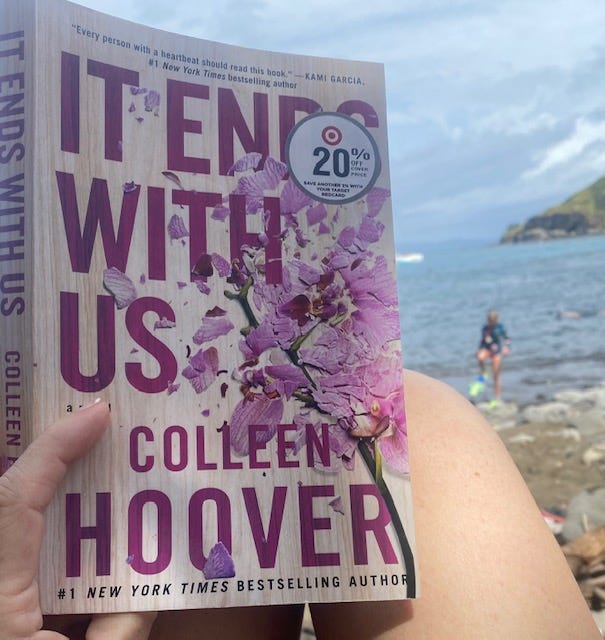Full disclosure: I admit to being lukewarm when it comes to anything deeply entrenched in genre. Whether sci-fi, fantasy, cozy mystery, or romance, I’m averse to any writing style that treads in trope at the expense of surprise. Romance, of all the genres, seems the most likely to traffic in predictability. In pattern. The mandate for a HEA ending (Happily Ever After) subverts my curiosity—which is the main driver of reader enjoyment for me. In other words, if ChatGPT can write it, it’s not for me.
Bring on the hate mail.
So, imagine my surprise when I accidently stumbled upon IT ENDS WITH US by Colleen Hoover within reach of my vacation bed last week on our Maui spring break trip, and instead of ignoring it, or reading the flap copy before tossing it aside, I cracked that bad boy open and got sucked right in (I’m sure Ms. Hoover is barraged with puns such as these. Hoover? Sucked? Well, you get the picture).
Background: I’d just come off a literary tear, consuming several critically acclaimed novels/memoirs (LESSONS IN CHEMISTRY; CRYING IN H-MART; GREAT CIRCLE, to name a few). Books that challenged me with their meticulously researched details and gorgeous writing. In audiobooks, I was on a Taylor Jenkins Reid binge, (also, I’ll listen to anything narrated by Julia Whelan); and as my husband and I drove up and down the Maui coastline, the dashboard speakers of our rented Kia entertained us with ONE TRUE LOVES.
Having IT ENDS WITH US and ONE TRUE LOVES banging around in my consciousness at the same time led to some tangles, I will admit. Both books are first person, mostly present tense, love stories filtered through a woman toggling between two lovers. Oh the dilemma! Oh the delicious heartbreak! Which one will she choose? Into what existential territory will these heroines yank us before setting us down in that blissfully satisfying HEA ending?
But, there were differences.
Hoover’s books lean into more of the contemporary romance trope: devices to “tell” the reader stuff by hiding all that info and exposition under the guise of epistolary missives written—but not sent—to a real-world celebrity (Ellen DeGeneres, in this case); naming characters silly, romancy names like Ryle, Atlas, and our heroine, Lily Bloom. Oh, and Lily Bloom somehow inherits enough money to open a flower shop in Boston upon the death of her father, even though her mother’s still alive, but that’s never really discussed.
TJR’s novel, like her others, fit more in the hybrid category of upmarket (literary with numbers, I’ve heard it called. Also, book club fiction). Her heroine’s name in ONE TRUE LOVES is Emma Blair, and she ends up running her family’s book store—also in the Boston area, by the way. The will-they-or-won’t-they question that seems at the heart of all romance books swerves into a decision between two men in both these novels. And, in both these novels, the decision ultimately rests upon the heroine’s earned agency—yay!
I have to admit, both of these books were penned by masterful story tellers. The pacing, the narrative accessibility, the consistency of voice, the page-turning strategies—all top notch, which is why both authors are best-sellers with tv/film deals.
Here’s an interesting article that takes a deeper dive into the phenomenon, and centers around Emily Henry (EmHen to her fans). The article reveals that part of the success of these authors has somewhat to do with the voraciousness of their audience; 46 percent of romance fans read at least one book a week!
But, hey, I’ve been reading at least two books a week this year myself (including my clients’ books), so count me in as a tentative “readership.”
Speaking of clients…I have room for a couple developmental edits this spring, and I’m hungry to help writers bring their drafts to submission quality. Anybody working on a contemporary romance, by chance? Click here for more info.







No hate here. Admittedly, I've never actually picked up anything by CH, but I'm certainly aware of her and her fans. When I was teaching semester after semester of English lit classes, I craved bodice rippers that didn't demand deep analysis. Lots of people love her, so there has to be something to her work. Nothing wrong with letting people enjoy things.